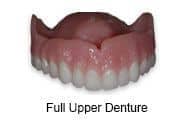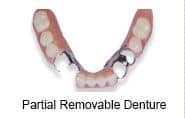What you should know about dentures
Dentures are removable replacements for missing teeth. They are made of an acrylic resin and may at times incorporate porcelain or metal for additional structural support. There are two main types of dentures, complete and partial.
Complete dentures and partial dentures are finely crafted and custom-fitted to the patient. Dentures can appear natural and provide a perfect smile. Dentures also help strengthen muscles controlling your facial expressions and help correct pronunciation problems caused by missing teeth.
Dentures may require that some teeth be extracted to improve their fit and functionality.
There are several types of dentures:
Complete Dentures
Complete dentures are replacements for all of your teeth, upper and lower. Their comfort depends on muscle, bones, tongue, and saliva. Patients begin wearing conventional dentures after healing of the gums, if teeth were extracted first.
Immediate Dentures
Immediate dentures are placed at the same time that teeth are extracted, and may require additional adjustments after the healing process. It can take months for your bone and tissue to stabilize after tooth extractions.

Upper Dentures
Upper dentures tend to be a bit easier to adjust to. These are made of the same materials as a complete denture, but are designed to provide you with upper teeth only.
Over Dentures
Over dentures are a type of conventional denture similar to complete dentures. The difference is that not all teeth are extracted and one or more natural teeth are used for their support. This type of denture provides greater stabilization during chewing. Over dentures cost more and typically require more dentist appointments for preparation until the procedure is fully complete.

Partial Dentures
Partial dentures are designed to correct the gaps in your smile when only some of your teeth are missing. Metal attachments anchor the dentures to your natural teeth. Partial dentures, also called a Removable Bridge, maintain tooth alignment by preventing your remaining teeth from shifting. Partial dentures can also help prevent loss of more teeth due to decay or gum disease.
Implant Retained Dentures
Implants can provide a solid mounting surface for denture wearers that have problems with denture slippage. Implant retained dentures can dramatically improve the quality of life for many denture wearers.
How long does it take for new dentures?
The procedure varies greatly, based on the extent of preparation required and the health of the patient. The Manhattan Dentist, Dr. Binder will help you decide which denture system is the most appropriate for you and provide you with a estimate of how long the procedure will take.